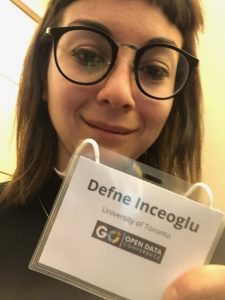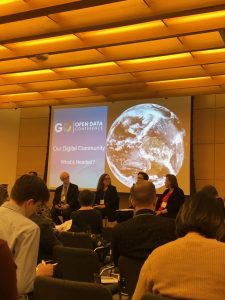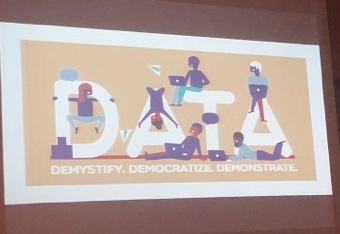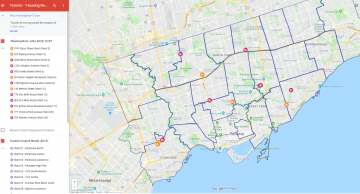
The banner from this year’s Go Open Data’s website. Image source: 2019.go-opendata.ca
I had the opportunity to attend the Go Open Data Conference or GOOD ’19 hosted this year at the breath-taking Toronto Reference Library in downtown Toronto. Being both a researcher, student and a contributor for Digital Tattoo, the conference included many themes and discussions around data which were of personal interest to me. My companion for the day was Elyse Hill, a former contributor to Digital Tattoo (find some examples of her work here, here and here). Some major topics covered were: How we can protect and regulate data collected on everyday citizens with impending ‘Smart Cities’ (Sidewalk Labs), the implications of artificial intelligence, what ‘data’ and ‘openness’ mean to diverse groups, education, youth & open data and the ethics of collecting & analyzing data; these are just a handful of ideas and talks that circulated throughout the day. Read on for more details!

The Toronto Reference Library. Creative Commons CCO 1.0 Universal Public Domain Dedication.

A excitedly blurry selfie at the beginning of the day! I was eager to learn about Open Data!
The discussion began with the Keynote address, with Tracey Lauriault, Johnathan Dewar and Teresa Scassa acting as the panelists. Lauriault, an Assistant Professor in Critical Media and Big Data from Carlton University provided a spirited address to the implications of Smart Cities and how they may alienate further those who are already marginalized. Dewar, the Executive Director at the First Nations Information Governance Centre (FNIGC), spoke about the FNIGC’s work in ensuring that First Nations’ peoples had access and autonomy over their own data collection; including creating sophisticated censuses of First Nations reserves that had been failed by the Government of Canada. Scassa, from the Information Law and Policy University of Ottawa, addressed the growing concerns around AI and data collection policies.
Following the Keynote, the next panel, titled “Our Digital Community – What’s Next?” tackled ‘next steps’ for both cities and rural communities with issues surrounding access to digital resources. Some great points were raised in favour of public libraries by Pam Ryan, who is the Director of Service Development and Innovation at the Toronto Public Library. With the worrying recent 50% cut to library budgets orchestrated by the Ontario government, there is a growing fear that libraries will lose their ability to provide digital resources to those who do not have access. The moderator and panelists both stressed the importance of understanding that many rural places in Ontario still do not have access to high speed internet. Inclusion was a strong theme for this talk!

Panelists during the Our Digital Community – What’s Needed? panel. From the official Program: “Our digital world holds many challenges as illustrated by Cambridge Analytica, issues related to the local Sidewalk Toronto initiative, the smart cities challenge happening in Canada and differences between our urban and rural communities. This diverse panel will speak to the current state of our digital community and where we need to go”. Image courtesy of Defne Inceoglu.
The next panel, Educators and Youth, was fascinating and very relevant as a student-representative. The panel included high school student Christopher Chifor, his high school teacher Sacha Noukhovitch, Marketing Manager / Girl Guides leader Elizabeth Robichaud and Jake Miller from Project Neutral, who not only is a graduate from the Faculty of Information at the University of Toronto (the Faculty which houses the U of T side of Digital Tattoo!) but also spoke on a panel at the IM Student Conference, which DT helped facilitate and contributor Monique wrote about here. The panel discussed the future of Open Data and how it will impact how students learn and teachers educate.

A slide from Heather Krause’s (CEO Datassist) presentation on data and ethics. Image courtesy of Elyse Hill.
Following a lunch break, the conference then had a series of breakout sessions around the library. We decided to attend a session hosted by Heather Krause (CEO Datassist) and Amy Bihari (Open Government Office, Province of Ontario), who spoke about data, ‘truth’ and ethics. In a fascinating discourse, Krause insisted that data is not objective and every instance in its collection, analysis and implementation is indeed biased.
In what was the most polarizing talk of the afternoon, HousingNowTO gave a presentation on their project, an interactive website and map designed to synthesize the proposed affordable housing project which is currently taking place in Toronto (read the official plan & policy from the City Manager here and follow up on HousingNowTO’s Twitter). What made this talk so important was the realization that there is a strong accountability that a city must take on when proposing a project such as this; where eleven new buildings (and 40,000 apartment units) are being proposed to be built in a small window of time. There is often a disconnection between what is proposed and what is implemented. It is the difference between fantasy and tangibility. As a student and resident of the city of Toronto, the talk around affordable housing is one that is absolutely crucial. As someone who has witnessed the woes of living in an expensive city, the questions that a contentious audience began to pipe out were quite thought-provoking. Keynote speaker Tracey Lauriault, who had been in the crowd, stated that Toronto (and other major cities in Canada) has continually seen a crisis of folks who are in need, folks who do not have the financial means to put a roof over their heads. In her opinion, why then does the city teeter on investing money into initiatives like ‘Smart Cities’ and affordable housing (as opposed to social housing or co-op construction)? The talk provided many points to think on as an informed citizen, with a social justice buzz happening in the crowd after her comments.

A screenshot from HousingNowTO’s website, showing the locations of the chosen sites. The data to make this map possible was in fact open data from the City of Toronto.
The concluding panel which was made up of many of the speakers present throughout the day, iterated a shared called to action: inclusivity, closing the digital divide, accepting an interdisciplinary approach, leaving our silos and educating folks on the potential of Open Data (as well as the risks).
Sitting through and absorbing the day’s talks, I could not help but think about the personal effect that many of these initiatives, issues and government policies may take. For instance, the digital divide that is present even today in Ontario is a real accessibility issue, one that can effect the likeliness of someone having equal opportunity as the world turns to a reliance on tech. It presents personal security and privacy issues, through the sophistication of AI and the proposal of ‘Smart Cities’ around the world. It presents the potential to further marginalize those who are already on the fringe. On the other hand, from a community perspective, Open Data can facilitate ease of knowledge sharing, transparent governments & create a space for creative thinking and development.
Go Open Data 2019 was truly a captivating experience which helped me better understand the contemporary issues that we write so often about on Digital Tattoo. The knowledge and perspectives the speakers offered really showed the caliber of the work being done in this field. It was a pleasure getting to attend and I look forward to next year!
Find more information about Go Open Data below
Edited by: Samantha Summers


Thank you for sharing your impressions, I would also like to attend the Go Open Data Conference, but probably it won’t be in this buzz because of the pandemic, what do you think?